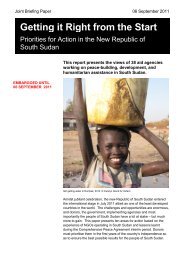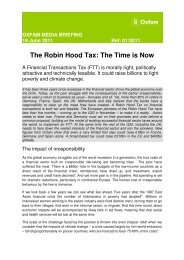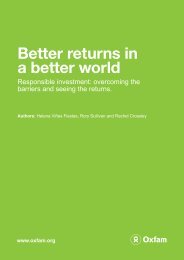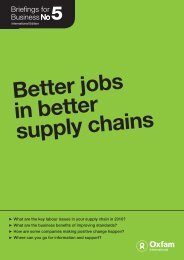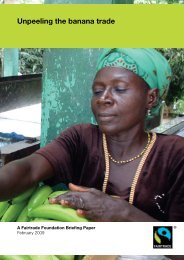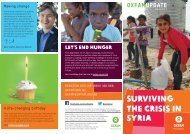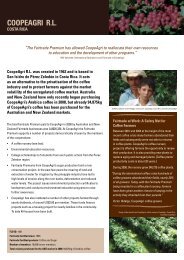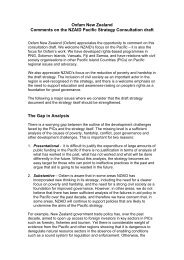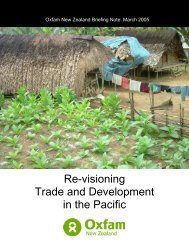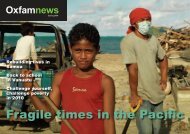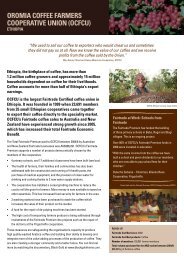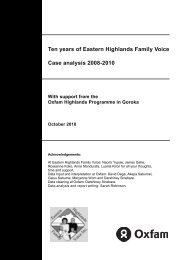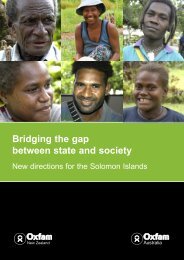Growing a Better Future - Oxfam International
Growing a Better Future - Oxfam International
Growing a Better Future - Oxfam International
- No tags were found...
You also want an ePaper? Increase the reach of your titles
YUMPU automatically turns print PDFs into web optimized ePapers that Google loves.
146 UNEP (2010) Africa Water Atlas: Improving the Quantity, Qualityand Use of Africa’s Water, http://na.unep.net/atlas/africaWater/downloads/chapters/africa_water_atlas_123-174.pdf147 IFAD (2011) ’High-yielding varieties of rice have been adopted onmore than 200,000 hectares of farmland’, Rural Poverty Report,http://www.ifad.org/rpr2011/report/e/rpr2011.pdf148 http://www.ifad.org/operations/food/farmer.htm149 Down from 20.4% in 1983. Calculated from OECD DAC5 OfficialBilateral Commitments by Sector database. Includes forestryand fishing.150 Progress has been uneven – but the number of countriesreaching or exceeding the goal had doubled by 2006, CAADP(2009) ‘How are Countries Measuring up to the MaputoDeclaration?’, CAADP Policy Brief, June 2009.151 The Economist, 25 February 2011.152 http://www.weforum.org/issues/agriculture-and-food-security/index.html153 The food and drinks company, Mars, recently entered into acollaboration with IBM and the US Department of Agriculture tosequence the cocoa genome and make it publicly available,arguing that in the long-run this will improve the sustainability ofcocoa production, most of which comes from small farmers. Seewww.cacaogenomedb.org154 The Cartagena Dialogue for Progressive Action is an informalspace open to all countries negotiating towards an agreementunder the UNFCCC. It aims to provide a forum in which partiescan step outside of their traditional negotiating blocs and openlydiscuss their positions and the rationales behind them, with aview to consensus building and furthering progress within theformal negotiations. It is currently attended by 30 countries.155 UNEP (2011) Towards a Green Economy.156 ‘Sustainable Bioenergy: A Framework for Decision Makers’,UN–Energy, 2007.157 Based on a one-third increase in oil prices over the next twoyears. http://blogs.odi.org.uk/blogs/main/archive/2011/03/16/oil_prices_poor_countries_africa_shocks_vulnerabilities.aspx?utm_source=mediarelease&utm_medium=email&utm_campaign=20110316158 http://news.mongabay.com/2010/1201-brazil_deforestation_2010.html159 UNEP (2010) ‘Universal Ownership: Why environmentalexternalities matter to institutional investors’.160 Chinese GDP in 2010 was estimated at $5.75 trillion at officialexchange rates according to the CIA factbook.161 According to Pew Centre Research, China topped the G20renewable investment league table – investing $34.6bn in 2009,compared to $18.6bn in the USA, in second place http://spreadsheets.google.com/ccc?key=tt8j-Ns4J9xxoQlFLf_vMfQ#gid=0162 http://www.ft.com/cms/s/0/85632536-74ed-11df-aed7-00144feabdc0,dwp_uuid=e11d5c1a-74ee-11df-aed7-00144feabdc0.html#axzz1IGpyVZcGImagesCover: Farmers in Astuare region, Ghana. Chris Young/<strong>Oxfam</strong>p3 The Phon family work farm their rice paddy inKompong Thom, central Cambodia. Abbie Trayler-Smith/<strong>Oxfam</strong>p4 & 25 Rice sellers Sok Nain and Mach Bo Pha in DemKor Market in Phnom Penh. Sellers say their profits havefallen by 30 per cent as rice prices in Cambodia soaredin 2008. (Cambodia 2008) Abbie Trayler-Smith/<strong>Oxfam</strong>p6 Families in Flinigue, Niger receive food vouchers from<strong>Oxfam</strong>. The vouchers give them the freedom to choosewhat they buy in a specified store. (August 2010)Caroline Gluck/<strong>Oxfam</strong>.p7 Kimba Kidbouli, 60 years, Niger. Caroline Gluck/<strong>Oxfam</strong>.p9 Women from Dola village construct a pond to irrigatetheir vegetable gardens. Nepal’s hill districts have lackedinvestment in agriculture and are faced with a rise in foodprices and reduced crop yields as a result of climatechange. (Nepal 2010). Tom Pietrasikp10 Yolanda Contreas Suarez, 53, 8 children, farmerand housewife, San Crostóbal. Lucy Brinicombe/<strong>Oxfam</strong>p14 Charles Kenani standing in his rice field. The<strong>Oxfam</strong>-funded Mnembo Irrigation scheme has helped400 families in Malawi by transforming their traditionalsmall low-yield crops into year-round, high volumeharvests that provide continuous food and a source ofincome. (Malawi, 2009). Abbie Trayler-Smithp16 Rice prices in Cambodia soared in 2008. The pile ofrice on the left was bought in 2008, and the pile on theright shows what the same money would have bought in2007. (Cambodia, 2008). Abbie Trayler-Smith/<strong>Oxfam</strong>p28 & 45 Noograi Snagsri now spends less time workingin her fields thanks to the new integrated farming systemwhere water is piped directly into the fields. In 2007farmers in Yasothorn Province, north-east Thailand,experienced the longest dry spell in decades.(Thailand, 2010). Mongkhonsawat Luengvorapant/<strong>Oxfam</strong>p29 Harvested palm fruit, the raw material for palm oil,used to produce various food stuffs, soap and biofuel.Tom Greenwood/<strong>Oxfam</strong> GB72



